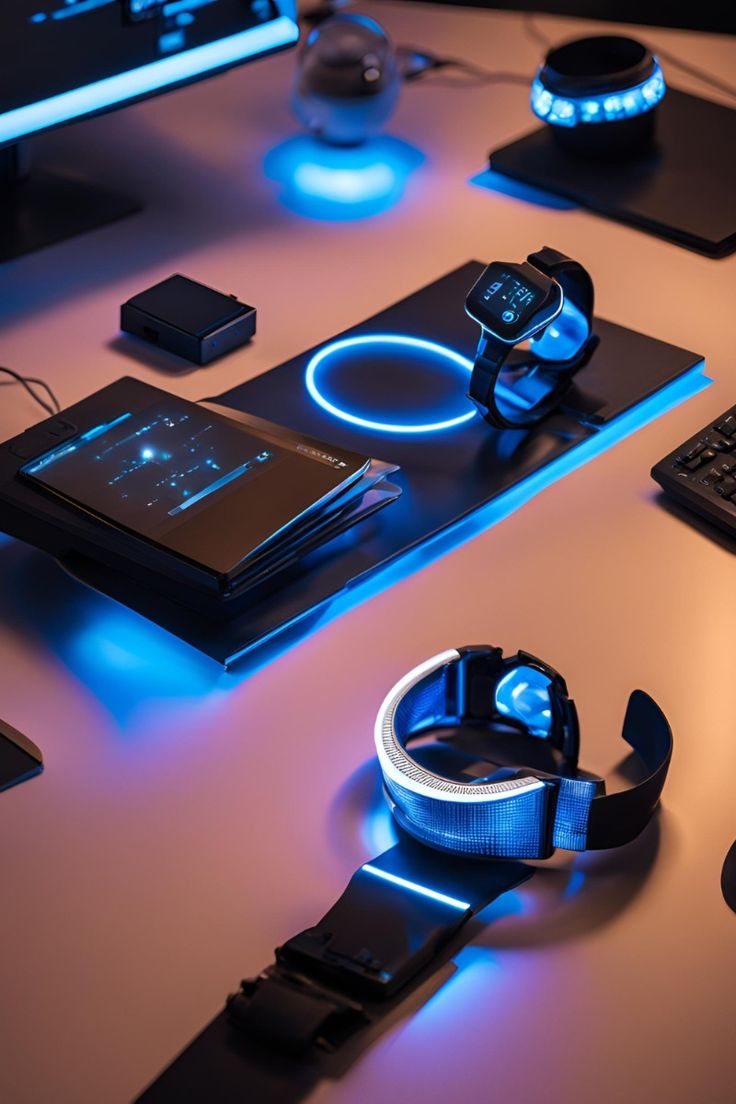Health Wearables and Biometric Technology: Transforming Personal Health and Wellness in 2025
Health Wearables and Biometric Technology: In 2025, the fusion of health wearables and biometric technology is leading a revolution in personalized healthcare and wellness. As people become more aware of their health and seek ways to improve their overall well-being, these technologies are offering real-time data and insights that were previously inaccessible. Together, they empower individuals to monitor vital signs, track physical activity, and even predict potential health issues before they arise.
In this article, we’ll explore how health wearables and biometric technology are transforming personal health management and shaping the future of healthcare, offering a closer look at the innovations of 2025.
What Are Health Wearables?
Health wearables refer to smart devices designed to monitor and collect data related to an individual’s health and well-being. These devices, typically worn on the body like smartwatches, fitness trackers, or wearable patches, track various metrics such as heart rate, sleep patterns, calorie expenditure, physical activity, and even stress levels.
Key Features of Health Wearables:
- Heart Rate Monitoring: Continuous tracking of heart rate to detect any abnormalities.
- Step Counting & Activity Tracking: Monitors daily physical activity and exercise, encouraging a more active lifestyle.
- Sleep Tracking: Analyzes sleep patterns and provides insights on sleep quality.
- Blood Oxygen Levels (SpO2): Measures oxygen saturation in the blood, especially useful during high-intensity workouts or for those with respiratory conditions.
- ECG & Blood Pressure: Advanced wearables now offer ECG (Electrocardiogram) and blood pressure monitoring capabilities, providing users with comprehensive insights into heart health.
What is Biometric Technology?
Biometric technology involves the measurement and statistical analysis of physical characteristics and behavioral traits to identify individuals or monitor their health. In the context of health wearables, biometric sensors capture a range of vital information, from heart rate variability to skin temperature, which are used to track health status and predict potential risks.
Biometrics go beyond simple identification and are now being used for real-time health monitoring and wellness tracking.
Types of Biometric Technology Used in Health Wearables:
- Fingerprint Recognition: Secure authentication for health-related apps or wearable devices.
- Facial Recognition: Some devices are equipped with sensors that can analyze facial features to detect signs of fatigue or stress.
- Heart Rate Variability (HRV): A measure of the variation in time between heartbeats, which can offer insights into stress, recovery, and overall cardiovascular health.
- Gait Analysis: Using movement sensors to track walking patterns, gait analysis can identify abnormalities in physical activity and help with early detection of health conditions like Parkinson’s disease.
How Health Wearables and Biometric Technology Work Together
The integration of biometric sensors in health wearables allows for continuous real-time data collection, enabling users to monitor and analyze their health in a way that is both non-invasive and convenient. These sensors work together to provide a comprehensive picture of an individual’s health by capturing data such as heart rate, blood oxygen levels, sleep patterns, and even stress levels. By processing this data through advanced AI algorithms, health wearables can offer personalized recommendations, early warnings about potential health issues, and track long-term wellness goals.
For instance, a smartwatch with biometric sensors can continuously monitor heart rate variability, alerting users to significant changes in their heart rhythm or stress levels. At the same time, the activity tracker can offer suggestions for exercise or lifestyle changes based on the data collected, ensuring that the wearer maintains optimal health.
Top Health Wearables and Biometric Devices of 2025
1. Apple Watch Series 9
The Apple Watch Series 9 in 2025 takes biometric tracking to the next level. With advanced ECG, blood oxygen monitoring, and sleep tracking, this smartwatch helps users monitor their heart health, manage their stress levels, and improve sleep quality. The integration of AI enhances the ability to predict and alert users about potential health issues.
2. Fitbit Charge 6
Fitbit has long been known for its fitness-focused wearables, and the Charge 6 model brings advanced biometrics into the mix. In addition to heart rate tracking, step counting, and calorie expenditure, it now includes advanced sleep monitoring and stress management features. It also provides a daily readiness score to help users understand when they are fully recovered and ready for a workout.
3. Oura Ring 2
The Oura Ring 2 is a cutting-edge health wearable that tracks vital health data in a sleek and discreet ring form factor. It monitors sleep quality, heart rate, body temperature, and activity levels, providing in-depth insights into physical health and wellness. Biometric sensors built into the ring offer precision in tracking personal health, with AI algorithms that give personalized recommendations for improving sleep, exercise, and mental well-being.
4. Whoop Strap 4.0
The Whoop Strap 4.0 is designed for athletes and fitness enthusiasts looking for advanced metrics on recovery, strain, and sleep performance. With continuous heart rate monitoring, sleep tracking, and skin temperature sensors, it provides insights into an individual’s fitness and wellness, helping users optimize their training and recovery cycles.
5. Biostrap
The Biostrap wearable is another advanced health device that integrates biometric technology to provide continuous monitoring of heart rate, sleep, blood oxygen levels, and activity. It also includes features such as stress tracking and recovery analytics to help users optimize their health and fitness journey.
How Health Wearables and Biometric Tech Are Impacting Healthcare
Health wearables and biometric technology are bringing healthcare into the 21st century by making personalized care more accessible and convenient. These technologies are empowering individuals to take control of their health by providing continuous monitoring, actionable insights, and early warnings of potential health issues.
Here are some of the key ways in which these technologies are making an impact:
1. Preventive Healthcare; Health Wearables and Biometric Technology
Health wearables help users stay on top of their health and provide early detection of possible health risks, such as abnormal heart rhythms, blood pressure fluctuations, or sleep apnea. This early detection can lead to timely medical intervention, reducing the risk of more serious health conditions later on.
2. Chronic Disease Management; Health Wearables and Biometric Technology
For individuals with chronic conditions like diabetes, hypertension, or heart disease, health wearables with biometric sensors can help monitor key vital signs and make it easier for both patients and doctors to track disease progression. These devices can even send alerts to healthcare providers when vital signs go out of range, ensuring proactive care.
3. Fitness and Wellness; Health Wearables and Biometric Technology
Health wearables not only track physical activity but also monitor key health parameters such as sleep quality, stress levels, and recovery time. This enables individuals to make data-driven decisions to improve their fitness, well-being, and overall quality of life.
4. Mental Health Monitoring; Health Wearables and Biometric Technology
Biometric technology can track physiological markers of stress, such as heart rate variability and skin temperature, providing valuable insights into mental health. Combined with stress-reduction tips, breathing exercises, and relaxation techniques, health wearables are helping users manage their mental wellness more effectively.
Challenges and Considerations: Health Wearables and Biometric Technology
While health wearables and biometric technology offer a range of benefits, there are some challenges and considerations:
- Data Privacy and Security: Health data is sensitive, and the security of this data is a primary concern. Companies must implement strong encryption and privacy protections to ensure that personal health data is not compromised.
- Accuracy and Reliability: As health wearables become more advanced, ensuring that the data they collect is accurate and reliable is crucial. Incorrect data could lead to misdiagnosis or unnecessary panic.
- Battery Life and Comfort: Health wearables need to be comfortable for long-term wear while maintaining sufficient battery life to collect data throughout the day and night.
The Future of Health Wearables and Biometric Technology
As we move into 2025 and beyond, health wearables and biometric technology will continue to evolve and become more integrated into our daily lives. With advancements in AI, machine learning, and cloud computing, these devices will provide even more personalized insights and health solutions. The integration of these technologies with healthcare systems will lead to more efficient, customized care and improve the overall health and well-being of individuals worldwide.
Conclusion: Health Wearables and Biometric Technology
Health wearables and biometric technology are at the forefront of transforming personal health management in 2025. These innovations are making it easier for individuals to monitor their health, improve wellness, and receive early warnings about potential issues. With the continued growth of these technologies, we can expect a future where health is personalized, predictive, and more accessible than ever before.










